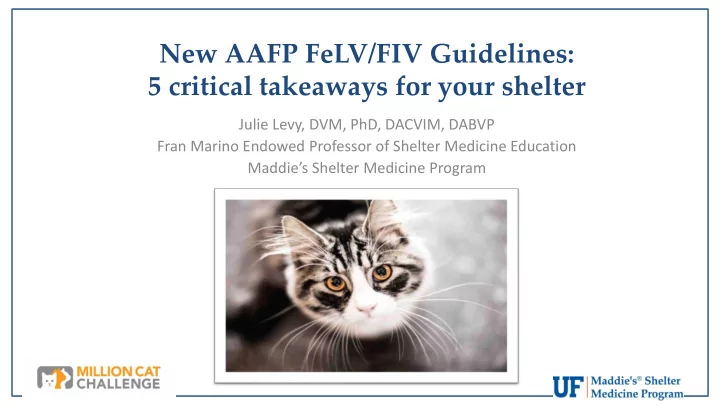

New AAFP FeLV/FIV Guidelines: 5 critical takeaways for your shelter Julie Levy, DVM, PhD, DACVIM, DABVP Fran Marino Endowed Professor of Shelter Medicine Education Maddie’s Shelter Medicine Program
• 26 pages of fine print . . . everything from virology to testing to vaccination to treatment . . . if you have a question, the answer is here! • Today we’ll focus on the breaking news – 5 key breakthroughs and emerging trends for 2020 • This is the lightning round!
1. Routine testing protocols 2. New FeLV staging plan 3. FIV+ cats can mingle 4. Paradigm shift for mass screening 5. Adoption is better
But first: A recap about feline retroviruses FeLV FIV • • Spread by fighting Spread by close contact and body fluids • Adult males most at risk • Kittens of infected queens • Very unlikely to spread in • Housemates homes or shelters • Fights • Outcome • Most common outcomes • Lifelong infection • Progressive • Very long asymptomatic • Increased risk of illness • Contagious period – may never get sick • Most test positive • Regressive • Normal lifespan • Not contagious • May test negative
FIV
FeLV
1. Routine testing protocols
FeLV/FIV testing option 1: one and done Point-of- care Test screening Result FeLV+ or FIV+ FeLV- or FIV- PCR required for critical FeLV testing, such as pre-screening blood donors
FeLV/FIV testing option 2: confirmation Point-of-care Test screening FeLV+ or FeLV- or Result FIV+ FIV- Confirmation: Repeat in 60 FeLV- or FIV- FeLV+ or FIV+ days if (confirmed) (discordant) PCR warranted
Avoid pitfalls in testing • Select a good test • Use the test the way it was intended • Not all cats in a group are the same • Don’t combine multiple samples for one test • Moms, litters, feral colonies, housemates can all have a different status • One cat = one test
2. New FeLV staging plan
New FeLV clinical staging Ag- Normal Abortive lifespan PCR- Ag- +/- normal lifespan ↓ PCR+ FeLV+ point-of-care Regressive Ag screening Ag+ +/- normal lifespan PCR- Ag+ Reduced Progressive lifespan ↑ PCR+ IDEXX Test Code 26355 FeLV Antigen by ELISA with FeLV Quant RealPCR™ Test
Can FeLV test panels predict outcomes? Ag-/PCR- Ag-/ ↓ PCR+ Ag+/PCR- Ag+ ↑ PCR+
JASPER: 4-year-old MC SNAP SNAP SNAP PetChek PetChek PCR Month PCR IFA Stage WB Plasma Serum Plasma Serum Quant 0 Pos Pos Pos Pos Low IND Neg Neg Regressive 1 Pos Pos Neg Pos Neg Pos Low Neg Regressive 2 Pos Pos Neg Pos Low Neg Pos Neg Regressive 3 Neg Neg Neg Pos Low Neg Neg Neg Regressive 4 Neg Neg Neg Neg Neg Pos Low Neg Regressive 5 Neg Neg Neg Pos Low Neg Neg Neg Regressive 6 Pos Pos Pos Neg Neg Pos Low Neg Regressive 24 Neg Neg Neg Pos Low Regressive 33 Neg Neg Pos Low Regressive Jasper is regressive and more likely to have a good long-term outcome 20
BASIL: 2-YEAR-OLD FS SNAP SNAP SNAP PetChek PetChek PCR Month PCR IFA Stage WB Plasma Serum Plasma Serum Quant High 0 Pos Pos Pos Pos Pos Pos Pos Progressive 1 Pos Pos Pos Pos High Pos Pos Pos Progressive 2 Pos Pos Pos Pos High Pos Progressive Pos Pos 3 Pos Pos Pos Pos Pos Pos High Pos Progressive 4 Pos Pos Pos Pos Pos Pos High Pos Progressive 5 Pos Pos Pos Pos Pos Pos High Pos Progressive High 6 Pos Pos Pos Pos Pos Pos Pos Progressive 14 Pos Pos Pos Pos Pos High Progressive Pos Pos High 23 Pos Pos Progressive Basil is progressive and more likely to develop disease sooner 130
CRAYOLA: 3-MONTH-OLD MC PCR SNAP SNAP SNAP PetChek PetChek Month PCR IFA Stage WB Plasma Serum Plasma Serum Quant 0 Neg Neg Neg Pos Low Neg Neg Neg Regressive 1 Pos Pos Pos Pos Pos Pos High 1% Pos Progressive 2 Pos Neg Neg Pos Low Neg Neg Neg Regressive 3 Pos Neg Neg Neg Neg Pos Low Neg Regressive Low 4 Pos Neg Neg Neg Neg Pos Neg Regressive 5 Neg Neg Neg Neg Neg Neg Neg Abortive 6 Neg Neg Neg Neg Neg Neg Neg Abortive 24 Pos Pos Pos Low Regressive 32 Pos Neg Neg Discordant Crayola defies the conventional staging expectations 16
3. FIV+ cats can mingle
Transmission very unlikely in group- housed FIV+ cats Spayed Low No & stress fighting “These results show a lack of neutered evidence of FIV transmission, despite years of exposure to Survival is longer in naturally-infected, FIV-positive homes cats in a mixed household .” than in shelters or sanctuaries
4. Paradigm shift for mass screening
The 2020 guidelines address an emerging trend in which screening for FeLV and FIV is increasingly shifting from animal shelters, where cats are adopted, to veterinary practices, where animals receive comprehensive care.
Still needed in shelters Test high-risk cats • Symptomatic • History of exposure Test to avoid in-shelter risk • Group housing • Prior to significant medical intervention • Legal cases Outstanding communication • Adopters understand need for early veterinary visit/segregation • Assure smooth hand-off of care from shelter to veterinarian • Veterinarians empowered to support adopters and FeLV+ cats
Still Testing • High-risk cats • Sick cats • Group-housed cats No Longer Testing • Single-housed cats • Cats < 6 months
5. Adoption is better
801 cats referred to FeLV adoption program
Adopter satisfaction
“People are adopting these cats, loving them, and not regretting it.” –Dr. Sheila Segurson, Maddie’s Fund
FeLV research breakthroughs made possible by a Thanks to Maddie! collaboration with Maddie’s Fund, University of Florida, Austin Pets Alive!, IDEXX, & the Winn Feline Foundation
Recommend
More recommend